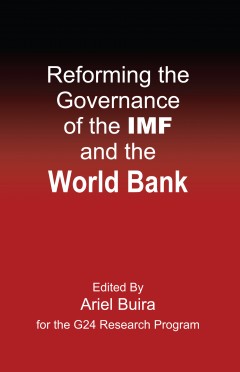Reforming the Governance of the IMF and the World Bank
Edited by Ariel Buira
Foreword by José Antonio Ocampo
Anthem Frontiers of Global Political Economy and Development
Other Formats Available:
E-Book- About This Book
- Reviews
- Author Information
- Series
- Table of Contents
- Links
- Podcasts
About This Book
Sixty years after their creation, the Bretton Woods institutions face a crisis of legitimacy that impairs their credibility and effectiveness. At the roots of this crisis lies the unrepresentative nature of their structure of governance, which places control of the institutions in the hands of a small group of industrial countries that do not use its resources. Developing countries and economies in transition are considered to be minor partners, despite accounting for half of the world’s output in real terms, most of the world’s population and encompassing the most dynamic economies and the largest holders of international reserves. The quota formulas should reflect the size of the economies of members, i.e. their GDP, their exposure to trade and capital movements as well as their ability to contribute to the Fund. If IMF quotas were based on objective measures, i.e. size of GDP, the volatility of receipts, the adjustment of European quotas for intra-trade and trade in a single currency in the euro area, the quota share of developing countries and economies in transition as a group should be no less than that of industrial countries. Reality has outpaced the evolution of thinking on the subject of governance. The growing breach between world economic and financial realities and the governance structure of the Bretton Woods institutions argues for reforms to increase the effectiveness and restore the legitimacy of these institutions. As debtors, the European countries had resisted conditionality during the first decades of the IMF and favoured increasing Fund resources, but as their situation changed, they no longer resorted to IMF support and they changed their position. Similar problems appear in the World Bank, giving rise to large negative flows of resources from the developing countries. The papers included in this book cover different aspects of the governance of the Bretton Woods institutions. They explore different options for reform and show that enhancing the participation of developing and emerging market countries in resolving the major monetary and financial problems confronting the world economy, would improve global economic performance and contribute to the elimination of world poverty.
Reviews
'This book deserves wide attention. I hope it inspires thoughtful debate - not just among international financial insiders in the world's capitals, but on Capitol Hill and Wall Street and their European counterparts, and in the university and business school classrooms of China, India, South Africa, Brazil and beyond.' —Nancy Birdsall, President of the Center for Global Development, Washington, D.C.
'This is a timely contribution to an essential debate in international economic governance, a debate that we hope will fulfil the historic promise of voice and representation made at Monterrey.' —José Antonio Ocampo, Under-Secretary-General of the United Nations for Economic and Social Affairs
'The essays by the experts collected in this volume clarify the positions of developing countries. They constitute an invitation to experts in the industrial countries and the European Union to further enrich this debate.' —Leo van Houtven, Former Secretary and Counsellor, IMF
Author Information
Ariel Buira is Director of the G24 Secretariat. He has been Special Envoy of the President of Mexico for the UN Conference on Financing for Development, Ambassador of Mexico, Member of the Board of Governors of the Bank of Mexico and Executive Director of the IMF. His publications include 'The IMF and the World Bank at Sixty' (Anthem Press, 2005) and 'Challenges to the World Bank and IMF: Developing Country Perspectives' (Anthem Press, 2003).
Series
Anthem Frontiers of Global Political Economy and Development
Table of Contents
List of Contributors; Foreword; 1. Introduction; 2. The Bretton Woods Institutions: Governance without Legitimacy?; 3. Reforming the International Monetary Fund: Towards Enhanced Accountability and Legitimacy; 4. Improving IMF Governance and Increasing the Influence of Developing Countries in IMF Decision-Making; 5. Issues on IMF Governance and Represenation: An Evaluation of Alternative Options; 6. Making the IMF and the World Bank More Accountable; 7. Purchasing Power Parities and Comparisons of GDP in IMF Quota Calculations; 8. Measuring Vulnerability: Capital Flows Volatility in the Quota Formula; 9. Enhancing the Voice of Developing Countries in The World Bank: Selective Double Majority Voting and a Pilot Phase Approach; 10. Voting Power Implications of a Double Majority Voting Procedure in the IMF's Executive Board; 11. Power versus Weight in IMF Governance: The Possible Beneficial Implications of a United European Bloc Vote; 12. Changing IMF Quotas: The Role of the United States Congress
Links
Stay Updated
Information
Latest Tweets



